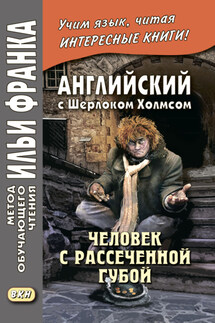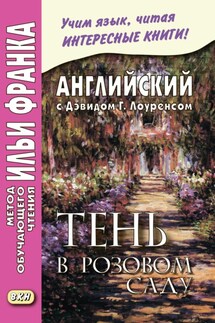Английский с Дэвидом Г. Лоуренсом. Тень в розовом саду / D. H. Lawrence. The Shadow in the Rose Garden - страница 3
).
For a moment or two he looked at her, watching her. She was a good-looking woman, who seemed older than he, rather pale, but healthy, her face yearning. Her rich auburn hair was heaped in folds on her forehead.
She looked apart from him and his world, gazing away to the sea (она казалась отделенной от него и его мира, вглядываясь вдаль, в море; apart – обособленно, в стороне). It irked her husband that she should continue abstracted and in ignorance of him (ее мужа раздражало, что она продолжала пребывать в своих мыслях и не замечать его; to irk – раздражать, надоедать; abstracted – погруженный в свои мысли; to abstract – абстрагировать/ся/; ignorance – неведение, незнание); he pulled poppy fruits and threw them at the window (он сорвал маковых коробочек и бросил их в окно; to pull – тянуть, тащить; рвать, срывать /цветы, фрукты/; poppy – мак; to throw – бросать, кидать). She started, glanced at him with a wild smile (она вздрогнула, взглянула на него с дикой улыбкой; wild – дикий; бурный, необузданный), and looked away again (и вновь отвела взор). Then almost immediately she left the window (затем почти тотчас же она отошла от окна; immediately – немедленно, тотчас; to leave – покидать, уезжать). He went indoors to meet her (он вошел в дом, чтобы встретить ее; indoors – внутри дома, в помещении; door – дверь; to meet – встречать/ся/). She had a fine carriage, very proud (у нее была прекрасная осанка, очень гордая; fine – прекрасный, превосходный; изящный; carriage – осанка; манера держаться; to carry – нести, носить; держаться, иметь какую-л. осанку), and wore a dress of soft white muslin (одета она была в платье из мягкого белого муслина; to wear – быть одетым /во что-л./; носить /одежду и т. д./).
“I’ve been waiting long enough,” he said (я достаточно долго жду, – сказал он).
“For me or for breakfast?” she said lightly (меня или завтрака? – весело спросила она; lightly – слегка; легко; весело, беспечно; light – легкий; несерьезный; веселый). “You know we said nine o’clock (ты же знаешь, мы сказали /подать завтрак в/ девять часов; o’clock /сокр. от of the clock/ – по часам, на часах). I should have thought you could have slept after the journey (я думала, ты мог бы и поспать после путешествия; to think – думать, полагать; to sleep – спать).”
“I’ve been waiting long enough,” he said.
“For me or for breakfast?” she said lightly. “You know we said nine o’clock. I should have thought you could have slept after the journey.”







